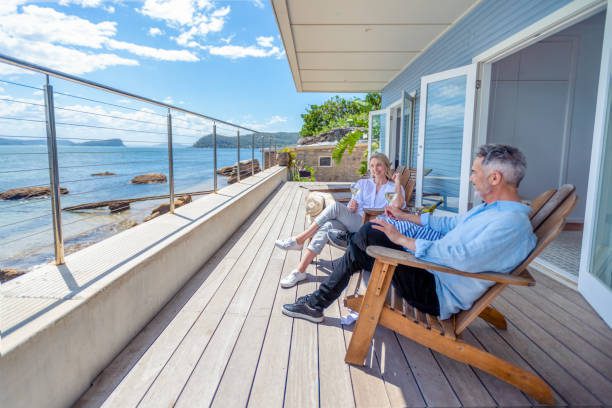When we think about travel, we often envision pristine beaches, towering mountains, historic cities—and plenty of quiet moments to reflect and unwind. Yet an emerging travel trend is shifting the focus: more and more so-called future travellers are not simply avoiding overcrowded destinations — they’re actively escaping noise pollution.

This blog will explore five powerful reasons why noise pollution is becoming a key driver in travel decisions, and how this shift might shape the future of how, where, and why we travel.
1. Urban areas are increasingly noisy — and it’s emerging as a health risk
The first reason future travellers are drawn away from cities and into quieter zones is because noise pollution is more than just unpleasant: it’s unhealthy. According to the European Environment Agency, over 30 % of Europe’s population lives in areas where transport-related noise levels exceed guidelines set by the World Health Organization. European Environment Agency+1

Long-term exposure to noise pollution has been linked to cardiovascular diseases, diabetes, and disturbed sleep—so fleeing the city isn’t just about comfort; it’s about wellbeing. European Environment Agency+1
For future travellers who value not just scenery but health, the idea of trading the perpetual hum of city traffic for silence becomes appealing.
2. Quietness is becoming a sought-after luxury in travel
As the awareness of noise pollution grows, so does the demand for trips that offer serenity. Travel blogs and sustainable-tourism sites report that “quiet travel” is emerging as a niche—but one with momentum. terminalesim.com
For example, destinations that actively reduce mechanical noise—through silent zones, electric only transport, sound-friendly architecture—are gaining attention.

What does this mean for travel? It means more travellers are selecting places where noise pollution is not just minimized—it’s the very reason they go. They’re seeking peace, not only beauty.
3. The travel experience itself is shaped by sound — and travellers want control
When we travel, the soundscape of a destination — the ambient noise, the hum of transportation, the chatter of crowds — often plays a larger role than we expect. Studies show that noise pollution affects how people move, choose activities, and even how they feel. For instance, in a nuanced study of commuters, noise levels were found to affect modal (transport mode) choices. PMC

Travellers increasingly realise: if I pick a destination where noise pollution is high, I might wake early with traffic, struggle to rest, or feel less connected to nature or place. In contrast, a destination where the soundscape is peaceful, the only audible buzz is the wind in the trees or waves on the shore, offers a richer experience.
Hence, escaping noise pollution becomes a factor in destination-selection as much as climate or scenery.
4. Nature and remote locations offer respite from constant noise
The urban environment is filled with sources of noise pollution—road traffic, aircraft, rail, nightlife. By contrast, many off-the-beaten-path destinations provide a dramatically different acoustic environment. Research into recreational spaces shows that after COVID-19 lockdowns, noise levels in some outdoor and remote areas jumped again as tourism returned—but they still remain far lower than in cities. SpringerLink

For future travellers consciously escaping noise pollution, this means destinations like national parks, quiet beaches, remote mountain lodges become not just an option—but a preferred norm.
When the goal is not only to see a place but to hear nothing, the silence becomes the feature.
5. Conscious travel meets conscious soundscapes: a new travel mindset
Future travellers are more than tourists—they are conscious travellers. They factor in sustainability, wellbeing, and sensory impact of travel. The growing recognition of noise pollution as an environmental hazard supports this shift. For example, young adults in cities like Dubai cite noise pollution as a stress factor. world-arabia.com

For these travellers, escaping noise pollution becomes part of a travel ethos: reduce stress, deepen connection, improve health, disengage from the constant stimuli of modern life.
It means choosing destinations that support acoustic wellness, not just visual beauty.
It means asking: “Will I be able to sleep, reflect, hear the natural world, hear myself think?”
And in that sense, the travel trend is moving: from “go to the city” to “go to silence”.
How travel suppliers and destinations are responding
Destinations and travel providers are already adapting to the escape-from-noise trend. Some investments include:
-
Creating “quiet zones” or “silent tourism zones” where mechanical noise is strictly regulated. terminalesim.com
-
Hotels and resorts branding themselves around tranquillity, sound-insulation, minimal ambient noise.
-
Urban retreats or “quiet quarters” within cities offering a hybrid: city-amenities but acoustic comfort.
-
Route-planning tools (for eco-travel/active travel) that include noise exposure as a factor. BioMed Central
These developments show that escaping noise pollution isn’t a fringe idea—it’s weaving into how travel is packaged and sold.
Tips for travellers looking to escape noise pollution
If you’re motivated by escaping noise pollution, here are some practical tips to make your travel count:
-
Research the soundscape: Search reviews mentioning noise, ask hotels about traffic or aircraft.
-
Choose destinations known for acoustic peace: avoid city centres near busy roads or flight paths.
-
Verify accommodations: check that rooms face away from highways, that good sound insulation is present.
-
Consider timing: quieter times (shoulder season, off-peak) often mean less crowd and less ambient noise.
-
Travel with purpose: ensure the destination’s vibe supports quiet — e.g., nature lodge, small village, minimalist resort — not just “less noisy city stay”.
-
Pack for silence: ear-plugs, white-noise apps, but ideally your environment itself should support quiet.
-
Value the quiet: Recognize that escaping noise pollution may cost more (premium for quiet resorts) but the benefit is greater wellbeing.
Why this matters for the future of travel
The shift away from noise pollution isn’t just a personal preference—it signals change in the travel industry and in how destinations are developed and marketed. As more travellers seek acoustic wellness, destinations will respond. This will drive investment in sound-friendly infrastructure, in noise-reduction measures in tourism design, and even city planning that preserves quiet.
In essence, “escaping noise pollution” might become a mainstream travel tenet rather than a niche. Future travellers will not only look at view and sunset—they’ll look at silence and soundscape. They’ll ask: Is this place quiet enough? Does it allow me to get away not just visually—but audibly?
In a world where cities hum and machines drone, the allure of silence grows stronger.
Final thoughts: from city hum to mindful hush
When you book your next trip, think beyond Instagram views and treat yourself to something more: silence. Ask yourself if your destination allows you to unplug from the constant machine-hum, the traffic roar, the aircraft engine overhead. If your answer is “no,” then maybe it’s time to explore a destination that lets you truly escape noise pollution.
The cities will always be there—but the quieter places, the restful retreats, the ones that value stillness—may become the hallmark of future travel.
After all, travel should lift you up, let you breathe deeply and rest. In the words of many travellers and researchers: sometimes what you really need is not more noise or excitement—it’s less. And that less begins by escaping noise pollution.
External links for further reading:
-
European Environment Agency. “Environmental Noise and Impacts on Human Health.”
-
TerminaleSIM blog: “Quiet Travel: The Ultimate Luxury Experience in 2025.”
-
International Journal of Health Geographics article on urban exposure to air pollution, noise and greenery.
-
Journal of Transport & Health: “How are air-pollution and noise perceived en‐route?”
-
World Arabia: “Noise Pollution Impacts Dubai’s Generation Z: Study Reveals.”
